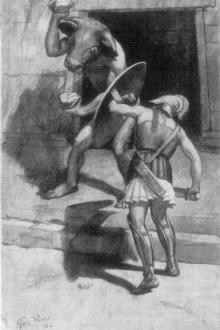The Story of the Greeks, H. A. Guerber [year 2 reading books .txt] 📗

- Author: H. A. Guerber
- Performer: -
Book online «The Story of the Greeks, H. A. Guerber [year 2 reading books .txt] 📗». Author H. A. Guerber
By demanding "earth and water," Darius meant that he wanted them to recognize him as their king, and as master of all their lands and vessels. The inhabitants of many of the islands and towns were so frightened by the messages sent by The Great King, that they humbly yielded; but when the messengers came to Sparta and Athens, they met with a different reception.
In both cities the people proudly replied that they were their own masters, and would not yield to the demands of the Persian king. Then, angered by the insolent command to give earth and water, the Spartans entirely forgot that the life of an ambassador is sacred. In their rage, they seized the Persians, flung one into a pit and the other into a well, and told them to take all the earth and water they wanted.
This conduct made Darius all the more angry, and he hastened his preparations as much as he could. He was so active that in a short time he was able to start out again, with an army of a hundred and twenty thousand men.
The generals of this force were Da´tis and Ar-ta-pher´-nes, who were guided and advised by the traitor Hippias. The fleet was to land the army on the plain of Mar´a-thon, close by the sea, and only one day's journey from Athens.
When the Athenians heard that the Persians were coming, they immediately decided to ask the Spartans, who were now their allies, to come to their aid, and help them drive back the enemy. As there was no time to lose, they chose as their messenger a fleet-footed Athenian, who made the journey of a hundred and fifty miles in a few hours, running every step of the way, and only seldom pausing to rest.
The Spartans listened breathlessly to his tidings, and promised that they would help the Athenians; but they added, that they would not be able to start until the moon was full, for they thought that they would be beaten unless they set out at a certain time.
The Persians in the mean while were advancing rapidly, so the Athenians started out to meet them with no other help than that of their neighbors the Pla-tæ´ans. The whole Greek force numbered only ten thousand men, and was under the command of the ten Athenian generals who were each entitled to the leadership for a day in turn.
Among these ten Athenian generals were three remarkable men,—Mil-ti´a-des, Ar-is-ti´des, and The-mis´to-cles. They consulted together, hoping to find a plan by which their small army could successfully oppose the Persian host, which was twelve times greater.
At last Miltiades proposed a plan which might succeed, provided there was but one chief, and all obeyed him well. Aristides, who was not only a good man, but also remarkably just and wise, at once saw the importance of such a plan, and offered to give up his day's command, and to carry out his friend's orders just as if he were nothing but a common soldier.
The other generals, not wishing to appear less generous than he, also gave up their command to Miltiades, who thus found himself general in chief of the Athenian and Platæan armies. So he speedily made his preparations, and drew up his small force on the plain of Marathon, between the mountains and the sea.
XLIV. THE BATTLE OF MARATHON.The Greek army seemed so very small beside the huge host of invaders, that the Persians felt perfectly sure that it would surrender as soon as the fight began. Imagine their surprise, therefore, when the Greeks, instead of waiting for them, gave the signal for battle, and rushed furiously upon them.
The daring and force of the Greek attack so confused the Persians, that they began to give way. This encouraged the Greeks still further, and they fought with such bravery that soon the army of The Great King was completely routed.
Hippias, fighting at the head of the Persian army, was one of the first to die; and when the Persians saw their companions falling around them like ripe grain under the mower's scythe, they were seized with terror, rushed toward the sea, and embarked in their vessels in great haste.
The Athenians followed the enemy closely, killing all they could reach, and trying to prevent them from embarking and so escaping their wrath. One Greek soldier even rushed down into the waves, and held a Persian vessel which was about to push off.
The Persians, anxious to escape, struck at him, and chopped off his hand; but the Greek, without hesitating a moment, grasped the boat with his other hand, and held it fast. In their hurry to get away, the Persians struck off that hand too; but the dauntless hero caught and held the boat with his strong teeth, and died beneath the repeated blows of the enemy without having once let go. Thanks to him, not one of those enemies escaped.
The victory was a glorious one. The whole Persian force had been routed by a mere handful of men; and the Athenians were so proud of their victory, that they longed to have their fellow-citizens rejoice with them.
One of the soldiers, who had fought bravely all day, and who was covered with blood, said he would carry the glad news, and, without waiting a moment, he started off at a run.
Such was his haste to reassure the Athenians, that he ran at his utmost speed, and reached the city in a few hours. He was so exhausted, however, that he had barely time to gasp out, "Rejoice, we have conquered!" before he sank down in the middle of the market place, dead.
The Greeks, having no more foes to kill, next began to rob the tents, where they found so much booty that each man became quite rich. Then they gathered up their dead, and buried them honorably on the battlefield, at a spot where they afterward erected ten small columns bearing the names of all who had lost their lives in the conflict.
Just as all was over, the Spartan force came rushing up, ready to give their promised aid. They were so sorry not to have had a chance to fight also, and to have missed a share in the glory, that they vowed they would never again allow any superstition to prevent their striking a blow for their native land whenever the necessity arose.
Miltiades, instead of permitting his weary soldiers to camp on the battlefield, and celebrate their victory by a grand feast, next ordered them to march on to the city, so as to defend it in case the Persian fleet came to attack it.
The troops had scarcely arrived in town and taken up their post there, when the Persian vessels came in; but when the soldiers attempted to land, and saw the same men ready to meet them, they were so dismayed that they beat a hasty retreat without striking another blow.
XLV. MILTIADES' DISGRACE.The victory of Marathon was a great triumph for the Athenians; and Miltiades, who had so successfully led them, was loaded with honors. His portrait was painted by the best artist of the day, and it was placed in one of the porticos of Athens, where every one could see it.
At his request, the main part of the booty was given to the gods, for the Greeks believed that it was owing to divine favor that they had conquered their enemies. The brazen arms and shields which they had taken from the ten thousand Persians killed were therefore melted, and formed into an immense statue of Athene, which was placed on the Acropolis, on a pedestal so high that the glittering lance which the goddess held could be seen far out at sea when the sunbeams struck its point.
The Athenians vented their triumph and delight in song and dance, in plays and works of art of all kinds; for they wished to commemorate the glorious victory which had cost them only a hundred and ninety men, while the enemy had lost ten thousand.
One of their choicest art treasures was made by Phidias, the greatest sculptor the world has ever known, out of a beautiful block of marble which Darius had brought from Persia. The Great King had intended to set it up in Athens as a monument of his victory over the Greeks. It was used instead to record his defeat; and when finished, the statue represented Nem´e-sis, the goddess of retribution, whose place it was to punish the proud and insolent, and to make them repent of their sins.
Miltiades was, as we have seen, the idol of the Athenian people after his victory at Marathon. Unfortunately, however, they were inclined to be fickle; and when they saw that Miltiades occupied such a high rank, many began to envy him.
Themistocles was particularly jealous of the great honors that his friend had won. His friends soon noticed his gloomy, discontented looks; and when they inquired what caused them, Themistocles said it was because the thought of the trophies of Miltiades would not let him sleep. Some time after, when he saw that Miltiades was beginning to misuse his power, he openly showed his dislike.
Not very far from Athens, out in the Ægean Sea, was the Island of Pa´ros. The people living there were enemies of Miltiades; and he, being sole head of the fleet, led it thither to avenge his personal wrongs.
The expedition failed, however; and Miltiades came back to Athens, where Themistocles and the indignant citizens accused him of betraying his trust, tried him, and convicted him of treason.
Had they not remembered the service that he had rendered his country in defeating the Persians at Marathon, they would surely have condemned him to death. As it was, the jury merely sentenced him to pay a heavy fine, saying that he should remain in prison until it was paid.
Miltiades was not rich enough to raise this large sum of money, so he died in prison. His son Ci´mon went to claim his body, so that he might bury it properly; but the hard-hearted judges refused to let him have it until he had paid his father's debt.
Thus forced to turn away without his father's corpse, Cimon visited his friends, who lent him the necessary money. Miltiades, who had been the idol of the people, was now buried hurriedly and in secret, because the ungrateful Athenians had forgotten all the good he had done them, and remembered only his faults.
XLVI. ARISTIDES THE JUST.The Athenians were very happy, because they thought, that, having once defeated the Persians, they need fear them no more. They were greatly mistaken, however. The Great King had twice seen his preparations come to naught and his plans ruined, but he was not yet ready to give up the hope of conquering Greece.
On the contrary, he solemnly swore that he would return with a greater army than ever, and make himself master of the proud city which had defied him. These plans were suspected by Themistocles, who therefore urged the Athenians to strengthen their navy, so that they might be ready for war when it came.
Aristides, the other general, was of the opinion that it was useless to build any more ships, but that the Athenians should increase their land forces. As each general had a large party, many quarrels soon arose. It became clear before long, that, unless one of the two leaders left the town, there would be an outbreak of civil war.
All the





Comments (0)